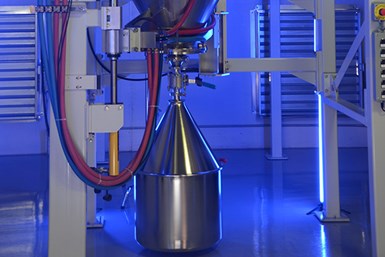6K Additive Plans to Double Powder Manufacturing Capacity, Expand Feedstock Preparation Facilities
The expansion will increase its facility by 35,000 square feet and add as many as 35 new employees.
6K Additive, a division of 6K, is planning to significantly increase production capacity for additive manufacturing (AM) powders. The company is a provider of sustainable engineered materials for AM and lithium-ion batteries produced from its UniMelt plasma technology.
The plan includes 20,000 square feet of additional powder production capacity with four new UniMelt microwave plasma systems as well as the addition of a 15,000 square feet in its material feedstock preparation building.
Over the last 12 months, the company says it has seen rapid growth in the demand for its nickel, titanium and refractory powders and this planned capacity increase will help the company meet its customers’ needs for the coming 12-36 months.
“Global unrest has shed a major spotlight on our nation’s supply chain vulnerability for critical materials,” said Frank Roberts, 6K Additive president. “This, in combination with our consistent product quality, sustainability benefits and the fact that we are a domestic supplier, have contributed to increased commercial activity with key strategic customers. This expansion will help us meet customer demands in the coming years and ensure efficiencies in current and future operations.”
Adding the feedstock preparation facility to its Burgettstown, Pennsylvania’s 45-acre campus provides 6K Additive with vertical integration of feedstock sizing for nickel and titanium in the same location. This will help to streamline operations and provide faster delivery as well as offer more control over the quality of the powder produced. The Burgettstown plant currently produces a full range of powders, including nickel 718 & 625, titanium-64, stainless steel and copper as well as capabilities to produce aluminum alloys.

6K Unimelt process. Photo Credit: 6K Additive
The company also runs two dedicated UniMelt production systems co-located in the company’s parent headquarters in North Andover, Massachusetts, where it produces tungsten, rhenium and niobium-based alloys for hypersonic, defense and rocket applications.
“The ability to meet the demands of our customers in both quality and delivery is paramount for our organization. The addition of a feedstock preparation facility and the added UniMelt production capacity will help to create a consistent operational flow to meet this demand,” says Eric Martin, 6K Additive chief operating officer. “However, I am equally excited to be able to bring on more talent to the organization with as many as 35 additional employees planned. It’s great for our organization as well as the tri-state area.”
6K Additive’s mission is to provide a solution for global decarbonization in producing performance materials that are critical to production in markets such as aerospace, defense, medical and industrial applications.
The company recently released results from a life cycle assessment conducted by Foresight Management which compares the environmental impact of 6K’s UniMelt microwave plasma technology to current atomization technologies in the production of metal powders. It is said the results showed upward of a 91% reduction in energy use and a 91.5% reduction in carbon emissions when using the 6K UniMelt process.
Related Content
-
How Norsk Titanium Is Scaling Up AM Production — and Employment — in New York State
New opportunities for part production via the company’s forging-like additive process are coming from the aerospace industry as well as a different sector, the semiconductor industry.
-
Postprocessing Steps and Costs for Metal 3D Printing
When your metal part is done 3D printing, you just pull it out of the machine and start using it, right? Not exactly.
-
This Year I Have Seen a Lot of AM for the Military — What Is Going On?
Audience members have similar questions. What is the Department of Defense’s interest in making hardware via 3D printing over conventional methods? Here are three manufacturing concerns that are particular to the military.
















